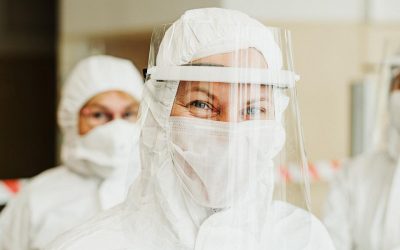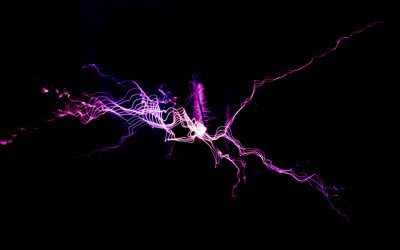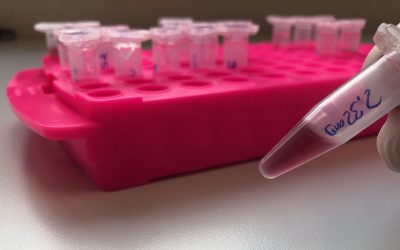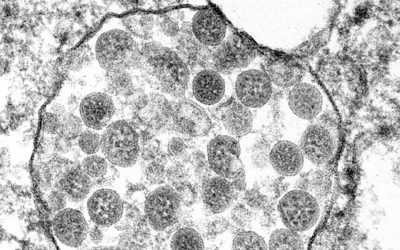Image credit: NCI
A potential vaccine candidate currently being developed by Pfizer and German partner BioNTech has been found to be 90% effective in people with no evidence of prior infection with the SARS-CoV-2 virus. The pharmaceutical companies made their announcement earlier today, sparking hope that control can be gained over the pandemic, which has killed over 1 million people worldwide and upended daily life.
“Today is a great day for science and humanity. The first set of results from our Phase 3 COVID-19 vaccine trial provides the initial evidence of our vaccine’s ability to prevent COVID-19,” said Dr. Albert Bourla, Pfizer Chairman and CEO. “We are reaching this critical milestone […] at a time when the world needs it most, with infection rates setting new records, hospitals nearing over-capacity, and economies struggling to reopen.”
Pfizer and BioNTech’s vaccine is one of many being developed around the world, and uses a the same messenger RNA (mRNA) technology as the one currently being developed by Moderna. They are alternatives to using viral particles in vaccine development, instead relying on small molecules called mRNAs that cells use to template and build proteins.
mRNA-based vaccines trick the body into producing some of the viral proteins itself, which are fragments and will not assemble to form a functioning virus. Instead, the body’s immune system will detect these foreign proteins and produce a defensive response against them. If approved, these will be the first vaccines of their kind to be licensed as currently, there are no RNA vaccines approved yet for human use.
The study included more than 43,500 global participants with diverse backgrounds. The vaccine is administered in two doses with protection achieved 28 days after initiation of the vaccination. The companies said they have so far found no serious safety concerns and expect to seek emergency-use authorization in the United States later this month.
The current efficacy was determined after 94 participants in the trial developed COVID-19 and scientists analyzed how they had received the vaccine versus a placebo, though the company has not provided details about this yet. The results have not been published in a peer review journal, but the companies have stated that they plan to do so once the trial is complete.
“When we embarked on this journey ten months ago this is what we aspired to achieve,” said Professor Ugur Sahin, BioNTech co-founder and CEO. “Especially today, while we are all in the midst of a second wave and many of us in lockdown, we appreciate even more how important this milestone is on our path towards ending this pandemic and for all of us to regain a sense of normality.”
The trial is continuing to enroll and is expected to continue until a total of 164 confirmed COVID-19 cases have accrued, after which a final analysis will take place. The study also will evaluate the potential for the vaccine candidate to provide protection against COVID-19 in those who have had prior exposure to SARS-CoV-2, as well as vaccine prevention against severe COVID-19 disease.
Along with efficacy data, Pfizer and BioNTech are working to prepare the necessary safety and manufacturing data to submit to the FDA to demonstrate the safety and quality of the vaccine product produced. The efficacy rate is well above the 50% effectiveness required by the U.S. Food and Drug Administration for a coronavirus vaccine.
The vaccine’s high percentage of those protected makes the findings compelling, as efficacy has long been a concern among experts who fear that a poor vaccine and possibly low vaccination rates will not allow populations to achieve herd immunity. The current results are heartening, though it’s still unclear how long protection will last. There are also additional questions concerning its effectiveness in high-risk populations, such as the elderly, as well as its ability to stop the spread of virus.
The companies have already begun to manufacture the vaccine, even before they knew it would be effective. Based on current projections, the companies expect to produce up to 50 million doses in 2020, which would be enough to protect 25 million people this year, and up to 1.3 billion doses in 2021.
This alone will not be sufficient to supply enough vaccines to curb the pandemic, which as of this week has reached 50 million cases worldwide. Many wealthy nations have already signed multi-billion-dollar deals will pharmaceutical companies like Pfizer, which has raised questions and concerns over when middle income and poorer nations’ ability to access inoculations. As of now, Pfizer and BioNTech have contractual agreements with the US, the European Union, the UK, Canada and Japan.
Many health experts and leaders around the world are welcoming the news, but urge caution and tempered expectation. Speaking to the BBC, Dr. Sophie Harman, global health expert at Queen Mary University London, said today’s news from Pfizer is “incredibly exciting” and could be a “major game-changer”.
“However, before we get too carried away we really have to be careful about safety and scale […] I don’t think we can go back to normal by Christmas or the New Year, as I am sure everyone would hope,” she added. “There’s a sort of tendency that when we get excited about vaccines is to think about vaccines as sort of silver bullet. And this cannot replace just the tried and tested methods of track and trace, monitoring the outbreak, and changing our behavior. So it’s extremely exciting, very hopeful, but let’s not take our eye off the ball of the very basics of how we respond to health crises.”

















